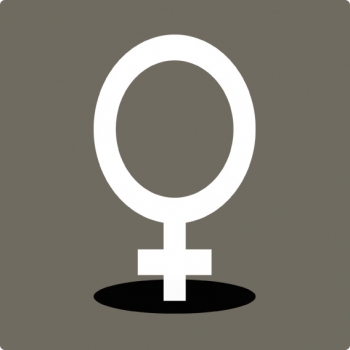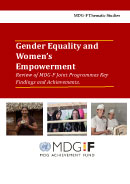

Gender Equality and Women's Empowerment
 Promote Gender Equality and Empower Women
Promote Gender Equality and Empower Women
Two thirds of the world’s illiterate adults are female and over 65% of its poorest people are women and girls. Across the world, gender-based inequalities continue to deny women a say in the decisions that affect their lives.
The MDG-F's work is rooted in the recognition that gender equality and women's empowerment are vital for the realization of human rights for all. In order to achieve gender equality, it is necessary to build a society in which women and men share equally in the distribution of power and influence and have equal access to education, health, decent work and livelihoods.
As a result, the MDG-F pioneered a dual strategy to strengthen women's rights and promote gender equality, with 13 programmes that directly bolstered women’s representation in decision-making processes, increased women´s capabilities, improved their access to resources and opportunities, and reduced their vulnerability to violence and conflict. Our work also improved legal systems to respect women’s rights, particularly those of marginalized indigenous and ethnic minority groups. As the indirect approach in our dual strategy, a gender perspective was incorporated into programmes across all our other thematic windows.
These programmes were designed to address gender equality in a broad and holistic manner, thereby contributing to the fulfillment of the civil, political, economic, social and cultural rights of women and girls, and supporting efforts towards MDG 3, achieving gender parity in education.
Among our successes: In the Occupied Palestinian Territory, the MDG-F conducted the first survey on gender-based violence in the workplace and supported the opening of the first-ever integrated shelter and facility to reduce violence against women in Gaza. Its work spurred the implementation of a National Strategy to combat gender-based violence.
In Nicaragua, nearly 114,000 women were consulted for the formulation of gender responsive budgets and local gender policies, and more than 23,000 women participated in local government decision-making processes, both of which led to gender mainstreaming in the national budget. In Ethiopia, the MDG-F targeted 100,000 adolescent girls and women with literacy training, business skills and access to credit to increase their economic opportunities, as well as HIV/AIDS and reproductive health education. And in Bangladesh, 24,000 people received awareness training on gender-based violence, including journalists, employers, judges, prosecutors, government officials, sex workers and many others.
RESULTS OF OUR WORK:
- 630,000 women and girls gained access to violence prevention and protection services.
- 24,000 women increased their income and 3,000 took on public decision-making positions.
- More than 1,500 public instituoins and nearly 450 private organizations strengthened their capacities to work more responsively towards gender equality.
Click here for a complete report of the indicators and results achieved by the MDG-F’s 13 joint programmes on Gender Equality and Women's Empowerment.
Success Stories

Analysis of key findings and achievements
This report captures the main achievements and experiences of the MDG-F’s programmes in this thematic window and presents their impact on the lives of communities across five regions. Prepared by an independent expert, the study is based on extensive desk reviews, interviews with selected joint programmes, and a thorough analysis and synthesis of inputs and contributions.
| Download Summary | Download Full Report |
|
Joint Programme Title
Country
MDG-F Programme Area
|
